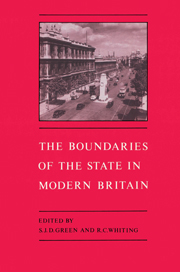Book contents
- Frontmatter
- Contents
- List of figures
- List of tables
- List of contributors
- Acknowledgements
- 1 Introduction: the shifting boundaries of the state in modern Britain
- Part I The state and political theory
- Part II The economy
- Part III Welfare and social policy
- Part IV Conflict and order
- Part V Religion and morality
- 14 Survival and autonomy: on the strange fortunes and peculiar legacy of ecclesiastical establishment in the modern British state, c. 1920 to the present day
- 15 Religion and the secular state
- 16 The British state and the power of life and death
- 17 Conclusion: on the past development and future prospects of the state in modern Britain
- Index
17 - Conclusion: on the past development and future prospects of the state in modern Britain
Published online by Cambridge University Press: 18 March 2010
- Frontmatter
- Contents
- List of figures
- List of tables
- List of contributors
- Acknowledgements
- 1 Introduction: the shifting boundaries of the state in modern Britain
- Part I The state and political theory
- Part II The economy
- Part III Welfare and social policy
- Part IV Conflict and order
- Part V Religion and morality
- 14 Survival and autonomy: on the strange fortunes and peculiar legacy of ecclesiastical establishment in the modern British state, c. 1920 to the present day
- 15 Religion and the secular state
- 16 The British state and the power of life and death
- 17 Conclusion: on the past development and future prospects of the state in modern Britain
- Index
Summary
The ‘Thatcherite’ revolution in the British state is over. Its passing was symbolised in the failure of her successor to secure the legislation necessary for the privatisation of the Post Office, in November 1994. To be sure, this was an ironic funereal symbol. For it represented defeat at the hands of a public, ancient institution to which the eponymous hero of denationalisation was intensely loyal. But the sense of a changing order was, and remains, unmistakable. The idea of an unambiguous direction in public policy – towards an ever smaller state – has died. And with its demise, it is becoming easier to view the events of the last two decades as in some way ephemeral, as the malignant products of a transitory ideology now discredited, or errors inspired by a malevolent view of the state now shown to be false and, presumably, soon to be subject to suitable reverse. This temptation, we believe, should be resisted. To some extent, that is because it attributes too much of the events of the past twenty years, at least as they have affected the state, to the impact of doctrine, and too little to the force of circumstances. But, still more, it is because it fails to recognise the real significance of what has actually happened to the British state – smaller and larger – during that time. Not only is relatively little of it reversible in the forseeable future. More importantly, the very question of its reversal will become less and less meaningful – less and less worth the asking – in the immediate years to come.
- Type
- Chapter
- Information
- The Boundaries of the State in Modern Britain , pp. 375 - 396Publisher: Cambridge University PressPrint publication year: 1996



